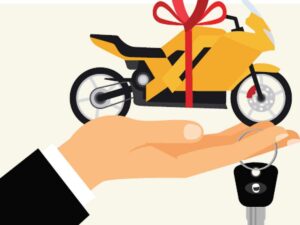
Everyone now relies on two-wheelers on a daily basis. Two-wheelers are everyone’s go-to option for getting to the market to buy goods or getting to work without wasting an hour in traffic. Because of the growing popularity of two-wheelers, another trend is gaining traction: two-wheeler loans.
So, what’s the deal with this two-wheeler boom?
- In the present pandemic situation, riding a bike is safer and more prudent than taking other modes of public transportation such as buses and trains.
- They provide excellent mileage and are cost-effective.
- Their maintenance is far easier and less expensive than that of four-wheelers.
- It’s easier to go around in traffic on a two-wheeler.
And if you don’t know-how, it’s much easier to learn to drive a two-wheeler than a four-wheeler. - They are also more environmentally friendly because they emit fewer emissions.
So, if you are one of those or are considering taking out a loan to get your very own automobile, you must avoid the following five blunders, as they could cost you your dream automobile:
Documents that are incomplete or inconsistent
Banks or lenders evaluate your information using the given papers before approving your loan application. Incorrect or inconsistent information in this section may result in an automatic rejection of your loan application. The following step is to ensure that all required documents have been submitted. Pay great attention to the list of papers that you need to submit to ensure this.
Having a Low Credit Score
Credit scores can range between 300 and 900. The better your credit score, the more likely you are to get approved for a two-wheeler loan. In most circumstances, a credit score of 750 or more is preferable. Bad or no credit is one of the most common grounds for loan rejection. Banks rate your profile as high risk since you have a history of defaulting.
As a result, banks or lenders may reject your loan application.
To increase your credit score, avoid erratic loan payments, settle outstanding obligations, and minimize credit card usage.
Income that is low or volatile
Banks and lenders analyze your income before granting you a loan to determine your ability to repay the loan amount. They also consider your work stability to be critical in terms of your ability to repay the loan.
The lender or bank will consider and investigate your creditworthiness, thus if you do not have a steady job, the lender or bank may believe that you do not have the finances to repay the loan on time. (For example, if you have recently changed employment, you may want to wait before asking for a loan; if you change employment frequently, such as every 6 months, banks may not consider you suitable for a loan.) If you don’t have a job, make sure you have other sources of income, such as interest payments or rental income, so you can pay your EMI on time.
This will guarantee that the loan application procedure runs as smoothly as possible.
Fixed Obligations to Income Ratio is Excessive (FOIR)
Though your fixed debt-to-income ratio (FOIR) is high, even if your income is high, the lender or bank may decline your loan. FOIR considers all of the obligations that the borrower must meet on a regular basis, such as rent, previous debt (such as credit card bills), EMI for other loans, and so on. The less FOIR you have, the better. This suggests you have enough money to pay back the loan. If your FOIR surpasses 40%, the lender or bank may refuse to make you a loan.
Other Considerations
Other eligibility conditions for loans include age (you must be at least 21 years old and no older than 60), nationality, and educational qualification. These issues could cause banks or lenders to reconsider your loan application. Your loan may also be denied if the company for which you work is de-listed or if you submit too many applications in a short period of time.
To start your search, you can look at the terms by the banks (Example: HDFC Bank Two Wheeler Loan)

